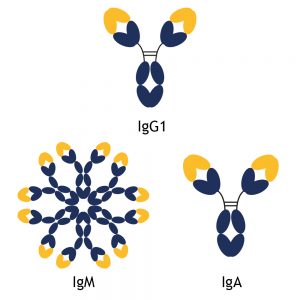 For a long time, ferrets have been known to carry many of the viruses which can also infect humans. Therefore, ferrets have become an important model organism in virology and are used to study various infectious diseases, including SARS-CoV-2, influenza, Zika and Ebola.
For a long time, ferrets have been known to carry many of the viruses which can also infect humans. Therefore, ferrets have become an important model organism in virology and are used to study various infectious diseases, including SARS-CoV-2, influenza, Zika and Ebola.
Absolute Antibody is pleased to announce the launch of ferret IgG1, ferret IgM and ferret IgA versions of many popular anti-virus antibodies, which can be used as serological controls for ferret immune responses, as well as for in vivo research in ferret models. These species-matched chimeric antibodies reduce anti-species immune responses in animal models, meaning the antibodies work for longer and cohorts respond more consistently. This will allow ferrets to be used as a model research animal in a wider range of viral diseases, contribute to the discovery of pathogenetic mechanisms, and help develop new potential therapies. In addition, ferret antibodies share high sequence conservation with mink, and thus can also be used as tools for mink veterinary applications.
Coronavirus Antibodies
In 2020, during the coronavirus pandemic, Denmark, the Netherlands and a number of other European countries decided to cull millions of mink in which a mutated coronavirus was found (Frutos and Devaux, 2020). Ferrets, another member of the Mustelinae subfamily, also gained attention during the pandemic as researchers investigated the species’ susceptibility to the novel coronavirus SARS-CoV-2.
Historically, ferrets have been used as a model organism to study respiratory infections. Recently, it was demonstrated that ferrets can indeed be infected with SARS-CoV-2; the virus was detected in the organisms’ nasal turbinate, soft palate, and tonsils signaling the occurrence of an upper respiratory infection and active replication (Shi et al., 2020). Furthermore, some ferrets were reported to have developed clinical symptoms of a respiratory infection and anti-SARS-CoV-2 antibodies were detected in all individuals (Shi et al., 2020). This suggests that ferrets can be a suitable model organism for studying the novel coronavirus.
Ferret IgG1, IgM and IgA versions of our anti-coronavirus antibodies can assist with serological analyses of ferret SARS-CoV-2 infections, aid research into intra- and inter-species transmission, help further establish this organism as a model for coronavirus research, and assist with studying syngeneic antibody therapy in ferrets.
Influenza Antibodies
Ferrets have been widely used in influenza research, as they are highly susceptible to human influenza viruses and do not need previous adaptation to be prone to the infection (Belser et al., 2011). These animals are important because they represent the only model that allows for studying both the pathogenesis and transmission of influenza infection (Kiupel and Perpiñán, 2014). Ferret sera have been long used to assess the effectiveness of human anti-influenza vaccines against new seasonal strains of the virus. This species has also been useful in research to investigate the pathogenesis of the flu (Belser et al., 2011). We now offer our Anti-Influenza [2-12C] clone and Anti-Influenza Nucleoprotein [2-8C] clone in ferret versions to open and facilitate new research avenues.
Zika Virus Antibodies
Zika virus affects the nervous system, so it is increasingly important to develop an animal model more appropriate than rodents, which have lissencephalic brains (lacking gyrification, or surface convolutions). Ferrets are the smallest animals with a gyrencephalic brain, which is similar to the human cerebrum (Hutchinson et al., 2019). Additionally, their immune system more closely reflects the characteristics of the human immune system. Studies that investigated Zika infection in these organisms indicated that the infection impacted both the brain and skull (Hutchinson et al., 2019). We now offer our popular anti-flavivirus and Zika antibodies, including Anti-Flavivirus group antigen, Anti-Envelope protein, and Anti-NS1, in the new ferret versions.
Ebola Antibodies

Ebola is another example of a dangerous viral pathogen which does not have a suitable animal model. It is a particularly deadly virus that is still causing dangerous outbreaks, such as the most recent one in mid-February 2021 in Guinea. Again, ferrets were demonstrated to be a potentially suitable animal model for studying Ebola. One study showed that all ferrets infected with the Ebola virus developed the disease and either died or developed Ebola glycoprotein IgM and/or IgG antibodies (de la Vega et al., 2018). To support this growing area of research, we developed our popular Anti-Ebola Surface Glycoprotein [KZ52] clone in all ferret formats.
All Available Ferret Antibodies
The below list of antibodies are now all available off-the-shelf in ferret IgG1, IgM and IgA formats. If you would like to learn more about our ferret antibodies or how we can apply our species and isotype switching to other clones, please contact us. We have experience with a wide range of species (check out our cat COVID antibodies too!) and can convert any clones into any format upon request, including those in our recombinant antibody catalog or your own antibody with our custom antibody engineering services.
| Catalog Number | Clone Name | Antigen | Available Ferret Formats |
|---|---|---|---|
| Ab01680 | CR3022 | COVID-19 & SARS-CoV S glycoprotein | IgG1, IgM, IgA |
| Ab01690 | CR3018 (03-018) | COVID-19 & SARS-CoV Nucleoprotein | IgG1, IgM, IgA |
| Ab01691 | CR3009 (03-009) | COVID-19 & SARS-CoV Nucleoprotein | IgG1, IgM, IgA |
| Ab02018 | CV1 | SARS-CoV-2 Spike Protein | IgG1, IgM, IgA |
| Ab02019 | CV30 | SARS-CoV-2 Spike Protein (RBD) | IgG1, IgM, IgA |
| Ab01105 | 2-12C | Influenza A Virus | IgG1, IgM, IgA |
| Ab00729 | RSHZ19 (Felvizumab) | RSV | IgG1, IgM, IgA |
| Ab00252 | RSB15 | Pre- and Post-Fusion Conformation of HRSV F | IgG1, IgM, IgA |
| Ab01103 | 2-8C | Influenza A Virus Nucleoprotein | IgG1, IgM, IgA |
| Ab00230 | D1-4G2-4-15 (4G2) | Flavivirus Group Antigen | IgG1, IgM, IgA |
| Ab00779 | ZKA64 | Zika Virus Envelope protein | IgG1, IgM, IgA |
| Ab01006 | ZKA25 | Zika Virus NS1 | IgG1, IgM, IgA |
| Ab00690 | KZ52 | Ebola Surface Glycoprotein | IgG1, IgM, IgA |
| Ab00245 | DV10 | DIII Domain of Dengue E Protein | IgG1, IgM, IgA |
| Ab00774 | Fab 7d11 | Poxvirus L1 Protein | IgG1, IgM, IgA |
| Ab01401 | 8G5F11 | VSV-G | IgG1, IgM, IgA |
Latest News
Upcoming Events
Please join us at the following conferences and events. Stop by our booth, or get in touch to arrange a meeting.
See All Dates
 United Kingdom (UK)
United Kingdom (UK)